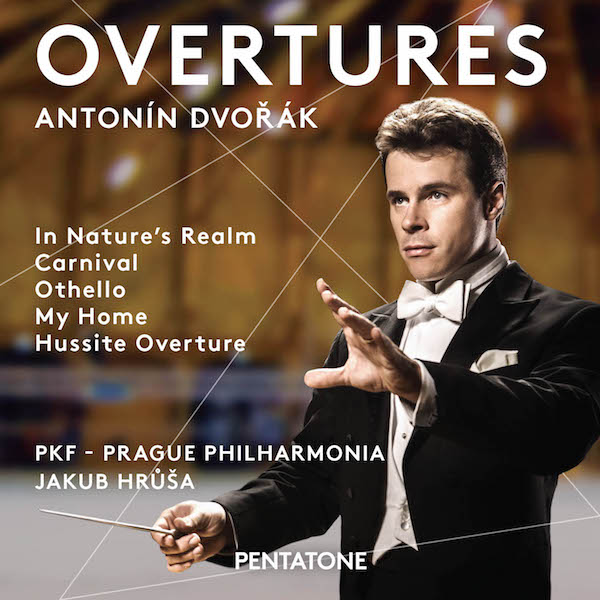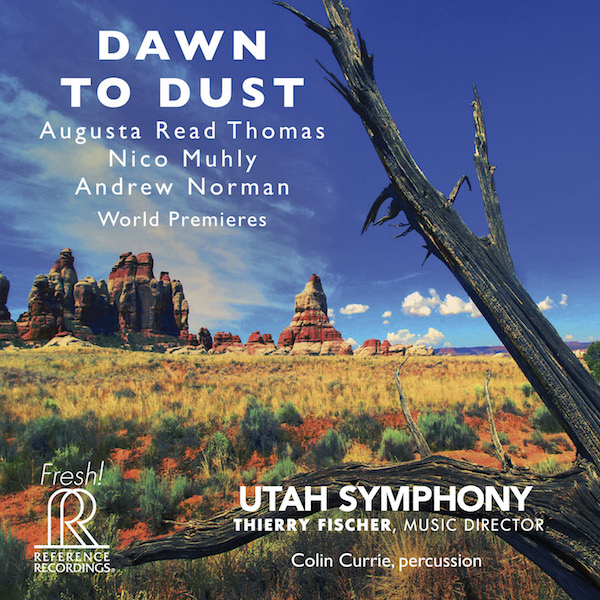Classical CD Reviews: Dvorak Overtures (Pentatone) and “Dawn to Dust” (Reference Recordings)
It’s no secret that 2016 has already been a strong year for albums featuring new and recent music: now things get even better with the release of Dawn to Dust.

By Jonathan Blumhofer
There’s more than a little to admire in the playing of the PKF – Prague Philharmonia’s recording of five Dvorak overtures on Pentatone: it’s colorful, clean, tonally warm, and often quite evocative. So the fact that the cumulative impression the album leaves is insignificant says more about conductor Jakub Hrůša’s approach to this music than anything else. In short, it’s way too deliberate and sluggish to really bring these scores — the “Nature, Life, and Love Trilogy” (In Nature’s Realm, Carnival, and Otello), My Home, and the Hussite Overture — to life.
On the whole, Hrůša, who’s done some fine things with this ensemble and the Czech Philharmonic, seems either uncomfortable with or simply bored by this repertoire. Take his account of the famous Carnival Overture. It begins brightly and energetically and at an appropriate tempo but its momentum never builds from there. The closing pages are taken at the same calculated speed as the opening ones, which robs the music of any sense of dramatic progression and also all but ignores the tempo acceleration written in the score, too.
My two old benchmark recordings of the piece (Fritz Reiner’s for RCA and Leonard Bernstein’s on Sony Classical) simply leave Hrůša’s take in the dust: both sound more brilliant and spirited and they build to such a high degree of intensity and manic energy over the closing couple of minutes that, more than six decades after they were taped, they remain among the most deliriously ebullient performances ever captured on disc. Of course I could be wrong, but I think it’s highly unlikely anyone will be saying anything like that about Hrůša’s Carnival in the 2060s.
Much the same can be said for the other readings on this album. Of course, Dvorak might shoulder some of the blame: after all, like many greats — think Beethoven, Wagner, Tchaikovsky, and Shostakovich — he could be a lousy self-editor and parts of these overtures meander. Even so, Charles Mackerras made much more of In Nature’s Realm and Vladimir Ashkenazy (not to mention Andris Nelsons this past February) mined greater depths in Otello than Hrůša does here. It’s perhaps telling that some (but not all) of the aforementioned conductors opted for livelier tempos: Mackerras’ Realm (with the Czech Philharmonic), for instance, clocks in at nearly ninety seconds faster than Hrůša’s, while Reiner’s Carnival (with the Chicago Symphony) is nearly a minute quicker.
But tempo alone isn’t the whole story: Ashkenazy’s Otello and Vaclav Neumann’s Hussite are more on par with Hrůša timings, as is Witold Rowicki’s reading of My Country. But those conductors (and the others) made this music speak with more energy, force, and urgency than does Hrůša.
It’s a shame because the Philharmonia really plays everything well. Technically, they’ve got the notes easily in hand and they do what they can, in these circumstances, with Dvorak’s colorful scoring. The wind solos (in In Nature’s Realm and Otello, particularly) sing nicely and the brass can be plenty imposing. But these interpretations never fully demand the listener’s attention and that’s primarily the fault of the conductor. Let’s hope his upcoming account of the marvelous Dvorak Rhapsodies — about as underrated a set of pieces as there are in the repertoire — are a completely different story.
*****

It’s no secret that 2016 has already been a strong year for albums featuring new and recent music: the premiere recording of Hans Abrahamsen’s let me tell you, two discs of music by Mason Bates, and Ora’s excellent account of commissions “reflecting” upon the music of William Byrd started the year off impressively. Now things get even better with the release of Dawn to Dust, a collection of three scores commissioned and performed by the Utah Symphony and its music director, Thierry Fischer.
The highlight of the disc is the debut recording of Andrew Norman’s riotous Switch, a percussion concerto that’s played here with aplomb by Colin Curie. Over the last twenty-odd years, there have been an impressive number of percussion concertos written by major composers — James MacMillan’s Veni, Veni Emmanuel; Christopher Rouse’s Der gerettete Alberich; and John Corigliano’s Concerto all come quickly to mind — but none of them seem to be (or to have) quite as much fun as Switch.
As he did in Play and Try, Norman packed this score with all sorts of wild sounds. Strings skitter and slide. The brass wail bilious glissandos. Winds join in the fun with some wild arpeggios but also inject a dose of serenity via a series of moving chorales. Three orchestral percussionists engage with the soloist, adding a jolt of impish uncertainty to the proceedings.
Like Norman also did in Play, the influence of video games and responses to specific gestures in the score provides Switch with much of its frenzied character. The piece basically falls into three sections, the outer ones motoric and the middle one a bit more reflective. It ends with a coda of affecting simplicity (not to mention theatricality: the soloist is instructed to walk off the stage after striking the last note. They’re also given the option of running on stage just in time to play their first entrance, too).
Whether or not Currie did the last for this performance is unclear (all the recordings on this disc were taped live), but he certainly plays the solo part with terrific athleticism and color. Fischer and the orchestra, too, deliver a commanding reading of this wild, sometimes-zany, ultimately eloquent score. It’s a triumph on all counts, but especially for Norman, who is quickly proving himself to be that rarest breed of composer: a brilliant technical wizard who is able to say and express complex ideas to a wide audience without ever watering down his craft. Wherever he goes from here is anyone’s guess but, in the breadth and freshness of his invention, it’s hard not to see him as the Millennial generation’s leading compositional light.
Filling out the album is Nico Muhly’s Control, a set of five movements inspired by the topography and history of Utah, and Augusta Read Thomas’ EOS (Goddess of the Dawn).
I’ve never really warmed to Muhly’s instrumental music: to me, it tends to lack focus and sounds derivative. Control is no real exception. Its best moments and textures call to mind other composers — most notably Aaron Copland, John Adams, and Olivier Messiaen — who wrote music of greater depth and emotional intensity.
That said, it does offer some striking episodes and characteristics. The writing for percussion throughout works very well, especially in the first movement. Muhly’s structuring of the second — particularly how he withholds the entry of the double basses until almost the very end — is smart, providing a welcome feeling of arrival once the music’s finally anchored by that low register. And the contrasts between rhythmic dissonance and consonance over the third and fourth movements are also highly effective. But there’s not enough to tie the whole piece together: it’s too busy, thematically, and, ultimately, expressively hollow to boot.
Better is EOS, Thomas’ seven-movement “ballet for orchestra.” This is a score that’s packed with color and energy and scored with breathtaking precision: no gesture or sonority is wasted, from the delicate, opening evocation of the dawn through to the closing blaze of sunlight. I’ve not always been a fan of Thomas’ cerebral style — too often it’s struck me as abstract and emotionally antiseptic — but EOS works better than not. Its narrative is neatly distilled and that, in turn, has brought out writing from Thomas of great focus and personality (listen to the Stravinsky-infused “Spring Rain” for some of her most charming music to date). As they also did in Control, Fischer and the Utah Symphony bring playing of vivid energy and bright color to Thomas’ score.
Despite, to my ears, some compositional shortcomings, then, this disc does stand among the most impressively-played and -recorded orchestral new music albums of the last several years – a remarkable fact, given the quality and pedigree of the competition. Clearly, there’s something special going on in Salt Lake City these days.
Jonathan Blumhofer is a composer and violist who has been active in the greater Boston area since 2004. His music has received numerous awards and been performed by various ensembles, including the American Composers Orchestra, Kiev Philharmonic, Camerata Chicago, Xanthos Ensemble, and Juventas New Music Group. Since receiving his doctorate from Boston University in 2010, Jon has taught at Clark University, Worcester Polytechnic Institute, and online for the University of Phoenix, in addition to writing music criticism for the Worcester Telegram & Gazette.
Tagged: Dawn to Dust, Jakub Hrůša, Pentatone, Prague Philharmonia, Reference Recordings, Thierry Fischer

